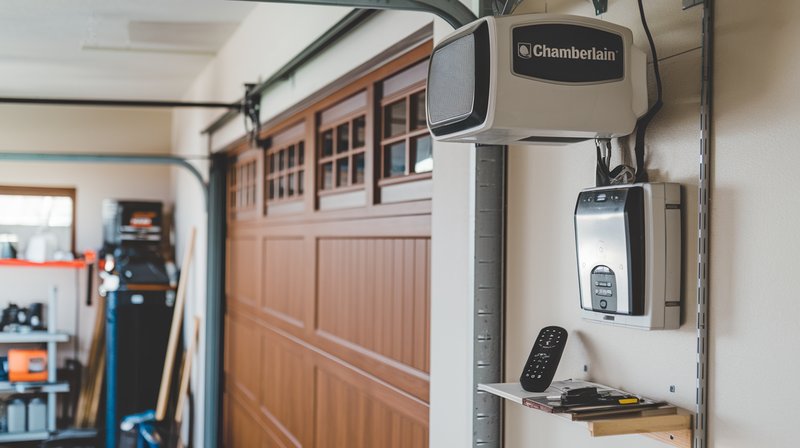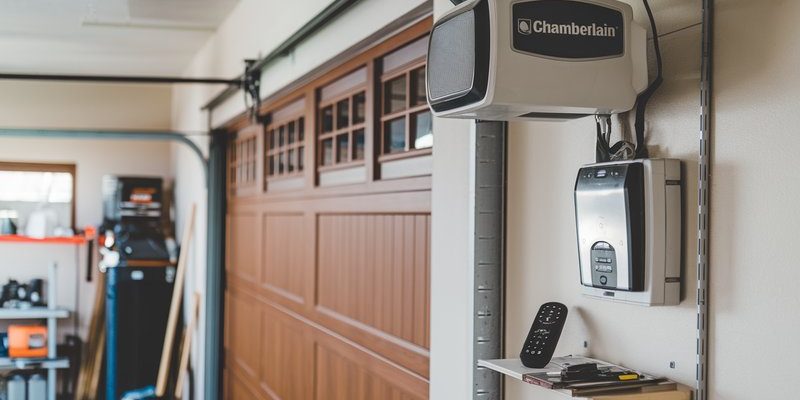
Let’s break it down. A garage door opener isn’t just about convenience; it’s about safety, durability, and energy efficiency. You might be thinking, “What’s the big deal?” Well, the way your opener operates directly affects how secure and easy to use your garage will be. So, whether you’re eyeing a heavy wooden door or a stylish custom steel door, you’ll want to ensure you pick an opener that can handle the load.
In this guide, we’ll dive deeper into the nuances of choosing a garage door opener specifically tailored for heavy or custom doors. We’ll explore different types, features, installation considerations, and troubleshooting tips to help you make the best decision for your needs.
Understanding Garage Door Weight Ratings
Before diving into what makes a good opener, it’s crucial to understand how weight affects performance. Most garage door openers come with a specific weight rating, which means they can safely operate doors up to that weight limit. Understanding these ratings is essential since heavy doors—like those made from solid wood or thicker steel—require more powerful motors to lift them smoothly.
You might wonder, “How do I know the weight of my door?” It typically depends on the material and thickness. Here’s a rough breakdown:
- Aluminum: Light-weight, around 70-120 pounds per 16-foot door.
- Steel: Moderate-weight, around 130-200 pounds per 16-foot door.
- Wood: Heavy; can go from 200 up to 300 pounds or more, depending on the type.
Knowing these weights will guide you in selecting a motor powerful enough to lift your door without straining—which brings us to our next topic!
Types of Garage Door Openers
Garage door openers generally come in three types: chain-driven, belt-driven, and screw-driven. Each type has pros and cons depending on your specific needs and the weight of your door.
Chain-Driven Openers
Chain-driven openers are the most common and usually the most affordable. They use a metal chain to lift the door and are excellent for heavy doors thanks to their robust construction. These are great if you have a budget in mind and are less concerned about noise. Just keep in mind they can be a bit noisy during operation.
Belt-Driven Openers
If you’re looking for a quieter option, belt-driven openers are the way to go. They use a rubber belt instead of a chain, making them much quieter. However, they are usually pricier than chain-driven versions. If you have living spaces above or adjacent to your garage, this might be worth the investment.
Screw-Driven Openers
These openers work using a threaded steel rod to lift the door. They’re less common but are known for their strength and low maintenance. They can handle heavy doors well but can lack the smoothness that belt-driven options offer.
Understanding these types will help you determine which one aligns best with your needs and your door’s weight.
Motor Power: What You Need to Know
Motor power is vital when selecting a garage door opener, especially for heavy doors. Openers are typically rated in horsepower (HP), with options usually ranging from 1/2 HP to 1 1/4 HP. Here’s a quick guide to help you decide:
- 1/2 HP: Suitable for lighter doors, such as aluminum or thinner wooden doors.
- 3/4 HP: A good fit for standard heavy doors made from steel or solid wood.
- 1 HP or more: Ideal for custom, oversized garage doors that require additional power to lift smoothly.
Opt for a motor that’s slightly above your door’s requirements for optimal performance. This gives you a buffer against wear and tear over time.
Features to Consider
When looking for a garage door opener, it’s essential not just to focus on the basics. There are some features that can enhance your overall experience. Here are a few worth considering:
Smart Technology
Smart garage door openers allow you to control your door remotely using a smartphone app. This is particularly handy if you frequently forget if you’ve closed the door or if someone else needs access while you’re away. Imagine getting an alert on your phone when the door opens or closes—how convenient is that?
Battery Backup
Power outages can happen, and if you live in an area prone to storms, a battery backup is a crucial feature. It ensures you can still operate your garage door even when the electricity goes out. Nobody wants to be stuck outside waiting for power to be restored!
Safety Features
Look for openers with safety sensors that prevent the door from closing if something is in the way. This isn’t just a feature; it’s a lifesaver. It helps keep kids and pets safe, which, let’s face it, is a priority for everyone.
Installation Considerations
Installing a garage door opener is easier than it sounds, but when it comes to heavy or custom doors, some extra steps might be involved. Depending on your DIY skills, this could be a job for professionals.
If you’re tackling it yourself, here are the steps you might encounter:
1. Gather Your Tools: Make sure you have all necessary tools handy, including a ladder, drill, and wrenches.
2. Read Instructions Carefully: Every opener comes with specific instructions. Follow them closely to ensure proper installation.
3. Mounting: Ensure you mount the opener on a strong structure. The weight of heavy doors calls for sturdy support!
4. Testing: After installation, test the door multiple times to ensure it opens and closes smoothly without any hurdles.
If at any point you feel overwhelmed, calling a pro is perfectly fine. The right opener installed correctly is essential for smooth operation.
Troubleshooting Common Issues
Even with the best products, issues can arise. Here are some common problems you might face with garage door openers, especially on heavy or custom doors:
Door Won’t Open or Close
This can happen due to blocked sensors or an unpaired remote. Check the sensors for obstructions and ensure your remote has fresh batteries. If it’s a sync issue, consult your user manual on how to reset or reprogram it.
Uneven Opening/Closing
If your door opens or closes unevenly, it might be off its tracks or require an adjustment in balance. Sometimes, cables can become worn, which can affect the operation. A small maintenance check might be all it needs.
Motor Doesn’t Respond
If the motor doesn’t respond when you press the remote, check if it’s plugged in properly, and look for any blown fuses. A reset may also help get things moving again.
Comparing Brands and Prices
When shopping for a garage door opener, it’s easy to feel overwhelmed by the variety on the market. Plus, price points can vary greatly based on features and brand reputations. Here’s a quick comparison of brands known for their reliability:
| Brand | Type | Price Range | Warranty |
| Chamberlain | Belt/Chain/Screw | $150-$300 | 1-2 years |
| LiftMaster | Belt/Chain | $200-$400 | 1-3 years |
| Genie | Chain/Belt | $120-$250 | 1-5 years |
Choosing a brand often comes down to personal preference and specific features that matter most to you.
Selecting the right garage door opener for heavy or custom doors doesn’t have to be a daunting task. Take your time to assess your door’s weight, materials, and features to find the perfect fit. With a little knowledge and careful consideration, you’ll end up with an opener that not only enhances the functionality of your garage but also adds value and safety to your home.
Remember, it’s not just about lifting your door; it’s about ensuring it works efficiently, securely, and fits seamlessly with your lifestyle. Happy garage door hunting!
